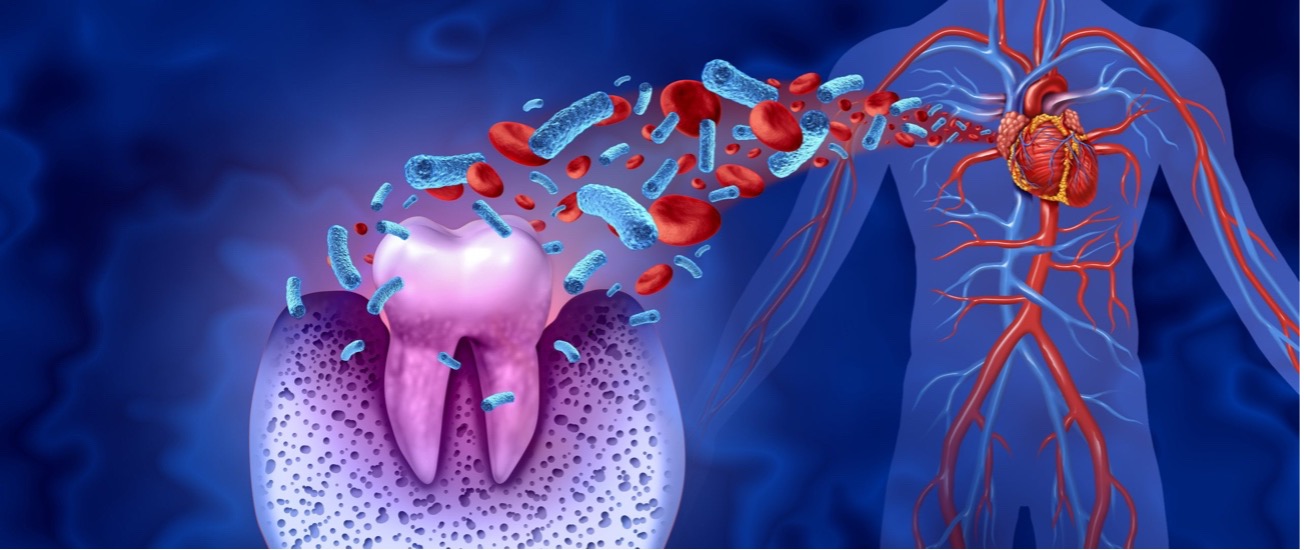More than 80% of adults in The Bahamas have some form of gum disease.
When your mouth isn’t cleaned properly, bacteria causes a sticky buildup on teeth and infects surrounding tissues. This leads gums to become red, swollen and tender. Many people don’t even realize they have gum disease.
1 in 4 deaths in The Bahamas stem from heart disease.
Heart disease is one of the nation’s leading cause of deaths and visits to the public clinics. It involves narrowing or blocking of blood vessels, which can lead to chest pain, a heart attack or stroke.
In this issue, we will discuss this compelling relationship of the heart disease and the oral cavity.
The Oral-Systemic Connection
The connection between oral health and heart disease is rooted in the concept of the oral-systemic link. This belief is that the health of your mouth can influence overall bodily health. The mouth, often considered a gateway to the overall health, can harbor harmful bacteria and pathogens that, if not managed, may lead to systemic issues.
Periodontal Disease: A Key Player
Periodontal disease, commonly known as gum disease, is a chronic inflammatory condition affecting the gums and bones supporting the teeth. It begins with plaque buildup, which can lead to gingivitis, the initial stage characterized by red and swollen gums. If untreated, it progresses to periodontitis, where the inflammation becomes more severe, potentially leading to tooth loss.
Periodontal disease is significant in the context of heart health for several reasons. Firstly, the bacteria responsible for gum disease can enter the bloodstream through the inflamed gums. Once in the bloodstream, these bacteria can attach to fatty deposits in the heart’s blood vessels, potentially leading to the formation of clots. This can increase the risk of a heart attack or stroke.
Secondly, the chronic inflammation associated with periodontal disease can contribute to the systemic inflammation linked to atherosclerosis, the buildup of plaque in the arteries. This inflammation is a key factor in the development and progression of heart disease.
Scientific Evidence
Numerous studies support the connection between oral health and heart disease. Research has shown that individuals with periodontal disease are almost twice as likely to have heart disease compared to those with healthy gums. Furthermore, treating periodontal disease has been observed to lower systemic inflammation markers, which are crucial in heart disease prevention.
A notable study published in the Journal of Periodontology found that people with periodontitis had a 19% increased risk of developing cardiovascular disease. Another study in the American Journal of Cardiology reported that patients who received treatment for periodontal disease experienced improvements in vascular health.
What are the Implications?
Understanding the relationship between oral health and heart disease underscores the importance of maintaining good oral hygiene. Regular brushing and flossing, along with routine dental check-ups, are essential in preventing gum disease. Additionally, adopting a heart-healthy lifestyle—balanced diet, regular exercise, and smoking cessation—can enhance both oral and cardiovascular health.
While more research is needed to fully explain the mechanisms linking oral health and heart disease, the evidence to date suggests a compelling relationship. Taking care of your teeth and gums is not just about preventing cavities or maintaining a bright smile; it’s also a crucial component of overall health, particularly heart health. By recognizing and addressing the oral-systemic link, individuals can take proactive steps towards reducing their risk of heart disease and improving their overall well-being.
Dr. Kendal V. O. Major is Founder and CEO of Center for Specialized Dentistry which is a comprehensive specialized & family dental practice operating in Nassau. He is the first Bahamian Specialist in gum diseases and dental implants since 1989. He also is a certified Fast braces provider, having attained Mastership status.His practice is located at 89 Collins Avenue, Nassau at (242)325-5165 or [email protected].

Bacteria from infected teeth move through bloodstream to infect the heart

Regular dental visits are important for early diagnosis





